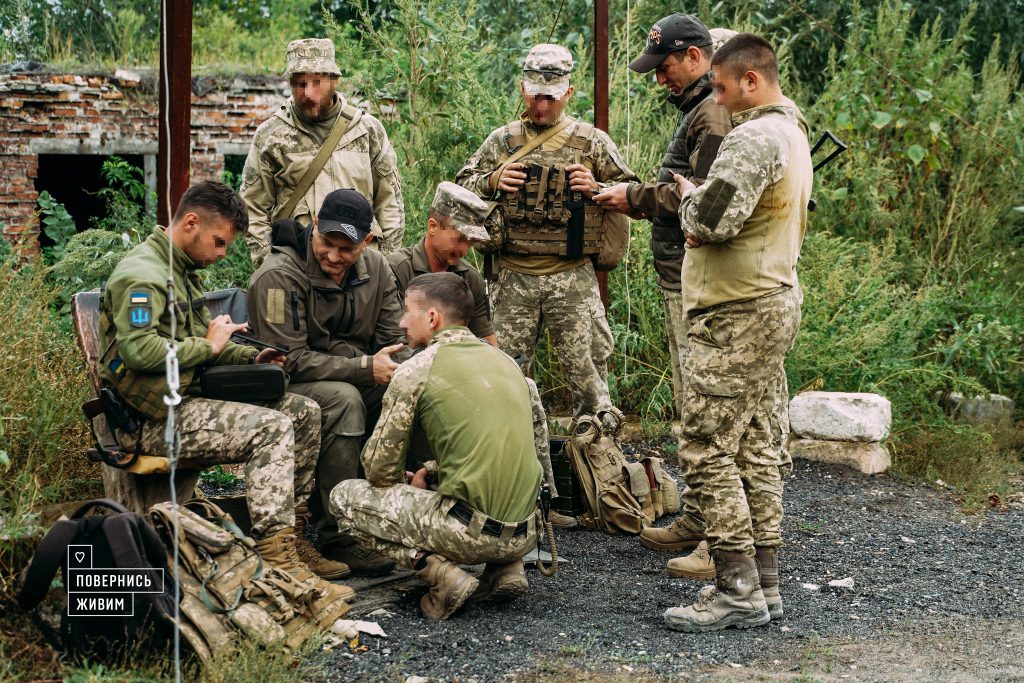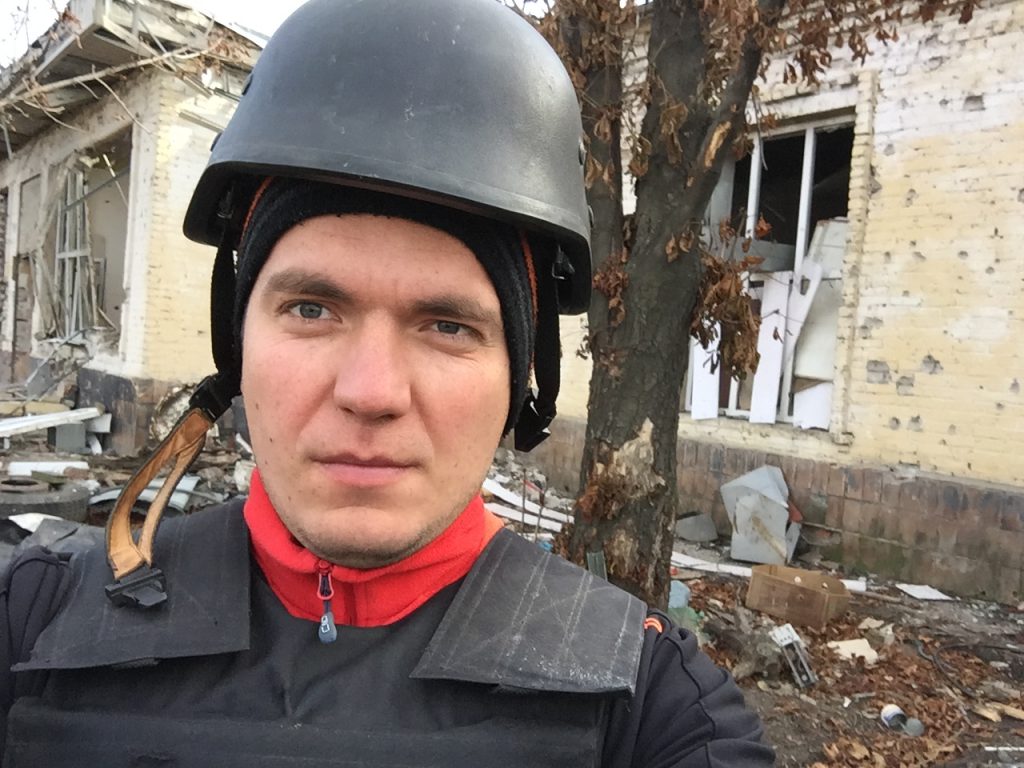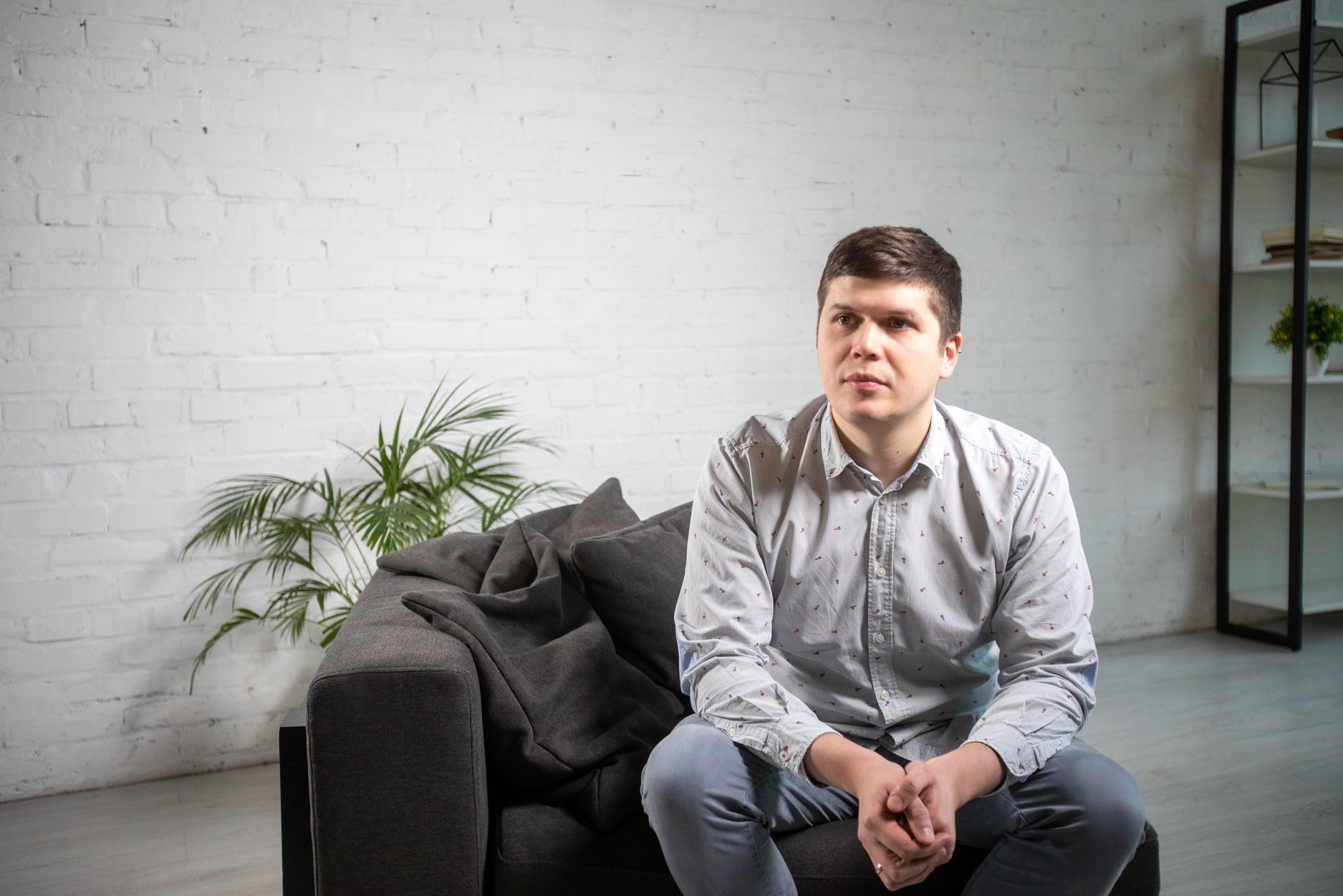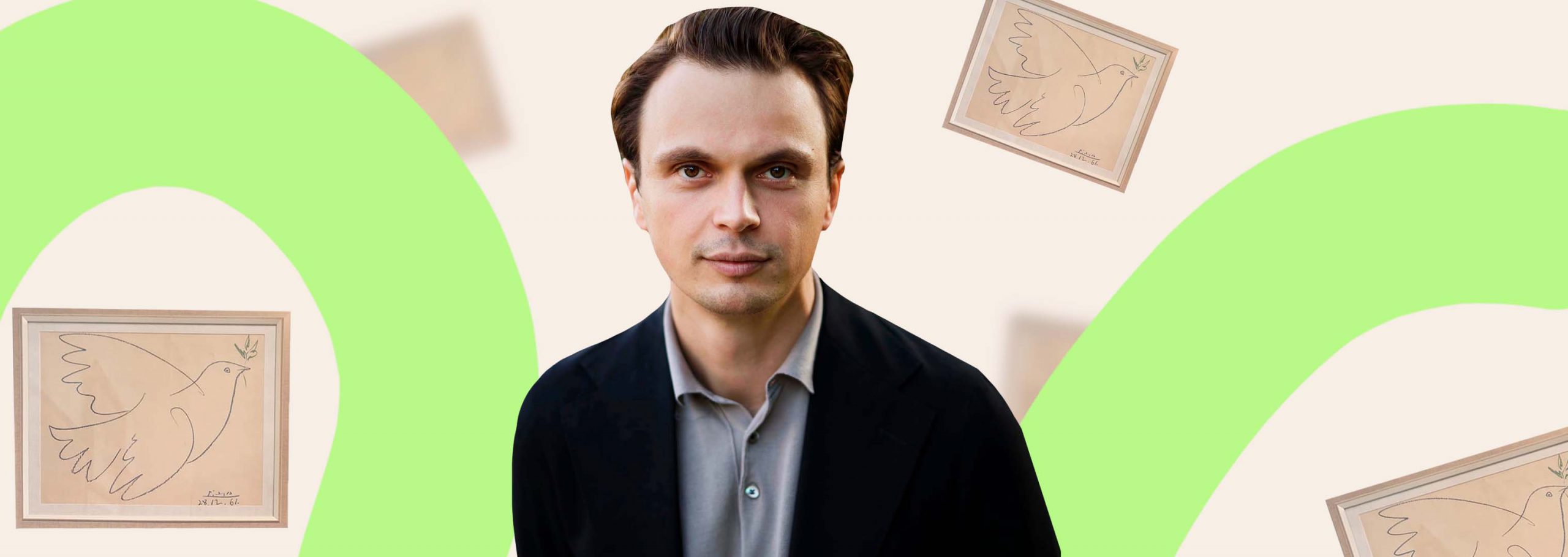The interview on why he left the post of the head of SaveLIFE Foundation, how he connects his publicity with the organisation’s promotion, and what achievements he considers the most worthy.
SaveLIFE Foundation is literally one of the most well-known foundations in Ukraine because of two reasons:
- as a foundation that effectively assists the military: provides them with thermal imagers and other equipment, works with veterans, conducts analytical and information activities;
- as a foundation headed for a long time by Vitaliy Deynega, an IT specialist who became an expert in the military sphere. He often comments on political processes, and government officials listen to his words.
For a year and a half now, Vitaliy has no longer been a foundation’s director. However, he still is a member of its Supervisory Board. We had a long conversation with Vitaliy on why he left the position of a director, about the effectiveness of philanthropists, and the leader’s role.
About the importance of the foundation
SaveLIFE Foundation in 2014 and now: are that two different organizations? What has changed?
In 2014, the foundation did not yet exist legally. Then we worked through other organizations because we believed that war was short-lived. In fact, SaveLIFE Foundation started working in 2015.
During the six years of our existence, global changes took place. One of the largest and most recognizable charitable organizations in Ukraine has emerged from scratch. Nowadays, the foundation employs about 30 people who receive regular salaries. They are involved not only in charity but also in working with veterans and analytical and training activities. For the first time, we conducted a sociological study on the motives of resignation from the military. The study explains why our army has such a high employee turnover rate.
The foundation also works a lot in the communications sphere. We write about the war and talk about the military. The monthly audience of our Facebook page is about 4 million readers. Furthermore, we have Instagram, Twitter and Tiktok accounts. The foundation also communicates via the website.

Here are the significant advocacy achievements of the foundation:
That is what I can list without even thinking. In fact, there are much more victories.
What is the primary foundation’s focus now?
Since I have not been the head of the organization for a year and a half, I can’t say for sure. I am a current member of the Foundation’s Supervisory Board. Therefore, I am immersed primarily in strategic issues and can not tell you the exact number of purchased drones and surveillance cameras, trained military or analytical studies.
I have a question about this, but we will discuss it later. Tell us more about your cooperation with public authorities. Who has an impact on whom?
At various times, the foundation directly influenced personnel changes in the army, the Ministry of Defense and The Ministry for Veterans Affairs, up to the position assignment of ministers and national policies in national security.
We cooperate closely with The National Security and Defense Council of Ukraine, The General Staff of the Armed Forces, the Ministry of Defense and the Ministry of Foreign Affairs. Our focus is national security.
In the past, the government did not appreciate our work. The state institutions kept their distance from the foundation because of our publicity. We had to prove to the authorities that we had the expertise and an alternative approach that might be helpful for them. Nowadays, the situation is different, and we are taken into account. The foundation can give the authorities what they cannot get themselves and vice versa. Therefore, it is mutually beneficial cooperation.
For example, the foundation is currently one of the principal actors influencing the country’s territorial defense. Territorial defense is a crucial factor in case of a full-scale Russian invasion.
Are they still rather afraid of you?
Rather yes. We are the people who have a powerful instrument in the form of a million-strong audience. Even politicians do not like to confront us. However, there are exceptions, when some political force tries to attack us using their “talking heads”.
The foundation, in particular, deals with veterans’ affairs. Has the problem of military rehabilitation been resolved?
We deal with two types of rehabilitation: sports and business. Our work is aimed at supporting veteran entrepreneurs. Last year, the president said business education for veterans would be free. At the moment, I do not know at what stage this project is being implemented. However, we have achieved some progress in this direction.
The foundation directly helps veterans with business. We collaborated with Zagoriy Foundation and Kyiv School of Economics to enhance business education among the military officers.
In terms of sports, the foundation is a co-organizer of the Invictus Games. These games are only 10% about competitions. Its fundamental goal is to help with rehabilitation, an impetus for the veterans to start over. We have developed a comprehensive system for selecting participants, involving HRs, veterans, and psychologists to examine each player in greater detail. We needed to understand whether a person really needs to become a participant and how much it would boost his rehabilitation. Among the participants, some people were going through a tough time. Some of them hardly spoke due to depression and isolated themselves from the outside. Others didn’t want to live on because of oncology. Invictus Games helped them. Now they are sociable people.
The foundation is also a co-organizer of the Defenders’ March, which takes place after the official Independence Day parade.
SaveLIFE Foundation for years is called one of the most effective foundations in Ukraine. In your opinion, why the foundation is so efficient?
There are different studies on that. For example, I can’t be responsible for what is written on Wikipedia about us because we are not running it yet. People usually write about themselves on the service, but someone did it for us.
We have twice won Effie as the most effective marketing team. Twice, because exactly as many applied for the competition. We would have succeeded too if we had tried more. But these victories are not of much interest to us.
For me personally, research by the Zagoriy Foundation was significant. It said that we are recognizable on the level of top organizations. Only Victor Pinchuk Foundation, Rinat Akhmetov Foundation and the Red Cross were higher on the list. But at the same time, only our awareness is equal to the level of trust. That is an outstanding achievement.

About military supplies
Is it true that our army would not have survived without volunteers?
The role of volunteers shouldn’t be exaggerated, but at the same time, it shouldn’t be underestimated. Tanks, guns, and missiles are all in a state’s sphere. However, volunteers solved some particular issues where the state wasn’t fast enough. At the Donetsk airport, almost all thermal imagers were provided by volunteers. SaveLIFE Foundation provided more than half of them. Thermal imagers became one of the critical factors that helped our troops hold their positions at the airport. It was possible to see the enemy in advance with thermal imagers and call in artillery strikes. It’s better than playing Counter-Strike inside the airport. The thermal imagers from the government appeared after the hardest battles, the Minsk agreements and even the first Normandy Format.
Volunteers are more flexible and faster.
What is the current situation? Do volunteers have less work?
The influence of volunteers has diminished, but only because of less active hostilities. Yes, the state has provided a lot for the army, but there is still enough work.
Volunteers rather provide moral and psychological support for the military. When someone brings Olivier salad for New Year’s Eve, you should see their reaction. Then the military understands that they are not fighting for money.
Although some join the army for money, consequently, it affects their work.
So, is the statement that our army is fully equipped an exaggeration?
Well, we’re almost in NATO (smiles). Of course, it got better than when the war started. But there is still a problem with small-wheeled vehicles, CCTV cameras, and drones.
If we talk about NATO, the alliance has specific requirements for its members: a country in a state of peace must spend at least 2% of GDP on the army. We spend 2.6 – 2.7% in a state of war. Almost 80% goes to uniforms, salaries, payments to the wounded soldiers, food, refuelling, and ammunition. Only 20% of the military expenditures go to rearmament. Also, I want to add that now we have almost free cartridges from Soviet times. But sooner or later, it will run out.
Regarding the money for rearmament, it is enough only to restore Soviet equipment, repair something broken and sometimes buy something new. Obviously, our armed forces need more money.

So, why resignation from military service becomes a trend? According to your research, 65% of people leave after their first contract.
Money is far from being the first reason. They are important for people to come, but they can’t keep people in the army.
Quite important factors are, in particular, housing, work-life balance, the ability to spend time with oneself and one’s family, and the senior staff management style. There are many other reasons. We identified them and measured their impact quantitatively, conducting a professional external sociological survey in the Armed Forces with a representative sample of 2,000 people for the first time in history.
About his own role in promoting the foundation
In your opinion, how difficult is it to be a volunteer in Ukraine?
It depends on what you mean by that term. We are employees of a charitable foundation. But there are also volunteers in the team.
Many people want to join us to make history when it comes to charity. But it isn’t possible to work for a long time on the salaries in the foundation. After 6 years, I just got tired of sleeping on a mattress on the floor. Before the war, I hadn’t finished the renovation of my home. Therefore, I had some savings to live on. I spent that money in six months of volunteering. It was a life with a low comfort level.
According to the law, you have the right to use 20% of the charitable contributions for salaries and operational activities, don’t you?
From the beginning, the foundation took a principled position not to use any part of the contributions for its own needs. We fundraise separately for this purpose.
So, did you resign from the position of foundation’s head due to a lack of financial resources?
hree years before my resignation, I realized I was burning out. It was pretty challenging. I had been thinking about resignation for a while. On the other hand, the foundation was doing a crucial job for the country, so I couldn’t just abandon it. I decided to implement a standard structure in the foundation: to create a Supervisory Board and give them some power, in particular, to dismiss a director. I also realized that the foundation should undergo some political cycles in order to keep its influence regardless of the political landscape. It happened in 2017, but in fact, I left in 2020, as I planned.
Is it possible to remain a foundation’s head for a long time?
It depends on the development pace. We now participate in many general political processes. But in order to reach this level, to keep it and move on, it was essential to grow rapidly. It is known that the quietest places in the world are the cemetery and the morgue. All others require movement from a man. The faster you do it, the more problems you have. When you are an organization’s head, the faster your organization grow, the closer your burnout becomes. In the case of the organization itself, it becomes less manageable.
We used to have to update our staff several times because the tasks were ahead of the employees’ competence. Now the foundation is constantly developing. We no longer have to rush. Softer management is quite possible.
One of the first associations that arise when it comes to SaveLIFE Foundation is your personality. In your opinion, what role does the leader of the foundation play in its efficiency and popularity?
I can’t entirely agree with your statement. I specifically made the foundation much less associated with me than, for example, Tabletochki with Olga Kudinenko. The last time I was mentioned on the foundation’s pages was when I gave an interview to Yanina Sokolova, where I talked about the foundation (smiles).
I indeed could use this resource. Then the foundation would be equal to the surname Deynega. In this case, I would not have 50,000 followers on Facebook, but 3 million, as the foundation has.
Don’t you think you should take some credit for the foundation’s popularity among the Ukrainians?
Sure, I am more recognizable than any other member of the foundation. Journalists wanted me to be the speaker because I founded the foundation and headed it for six years. However, we have always promoted other speakers so that the foundation is never associated with one person. We have Andriy Rymaruk, who debuted as an actor in played Valentin Vasyanovych’s film Atlantis. He is a well-known man. The current director also shows up in the media quite often.
My publicity is much less important than the foundation’s publicity. If I am a media person, it means the foundation itself is a media company. The interview needs a hero, and the organization cannot use this communication tool without a speaker. A person needs a person.
About charitable contributions and what stimulates it
How much has the number of donations changed since the beginning of the war?
Information about all donations for the years of the foundation’s activity is stored on our website. The peak of donations, up to UAH 8 million per month, was in 2015, when the battles for Debaltseve and Donetsk airport took place. Then came the decline. On average, we now receive at least UAH 1 million a month.
In general, the amount leap happens when something happens in the East. Successful campaigns of the foundation also bring results. But other major project incomes raise these statistics. However, we don’t confuse it with people’s contributions. I am sure that if fighting intensifies in the East tomorrow, the amount will increase again. If a full-scale war breaks out, contributions can easily reach astronomical numbers. But such a price would not be desirable.
What is the largest donation your foundation ever received?
The largest donation for today is $ 50,000. The person brought cash, so I saw this person. But most donors are not technically visible, as they are anonymous. The average check is UAH 700-800, which is the highest amount among Ukrainian foundations.
Who is an average donor of SaveLIFE Foundation?
I divide them into male and female audiences. The man is under 40, relatively wealthy, and has a wife and children. He has a reason why he did not go to war. Again, because of the children, health or something else. He has a sense of duty that he could not fulfil, but he wants to help in another way.
As for women, this is a less well-off category but broader in type. They make contributions because the work of the foundation arouses their empathy. They are ready for more than just commenting on Facebook. However, we need these women as well. They increase the coverage of our posts and help to spread information.
Do you think that the reduction in contributions is because people are less worried about the war?
Definitely yes. What have you heard about the war in the news last month, apart from the death toll? And the issue is not in the media. It’s just that the human brain gets used to everything. We cannot be under permanent stress for the rest of our lives.
What has war changed in society?
And what hasn’t it changed? The Maidan stimulated the rules to change in the society. It became easier to run a business. People have become more principled, for example, reduced tolerance for corruption. And how culture has grown. Even that is enough.
In general, people’s needs have changed. When there is a lot of stress, the demand for entertainment grows immediately, where you can get rid of it. For example, there are more restaurants and bars, and the level of service and the struggle for the client have increased significantly.
But I would like these changes to be more permanent. All the achievements we have made through the efforts of the Ukrainian State Film Agency, Ukrainian Cultural Foundation and other cultural institutions must be long-lasting. It seems to me that the main thing is not the pace of reforms but their irreversibility.
Translated by Oksana Plakhotniuk






